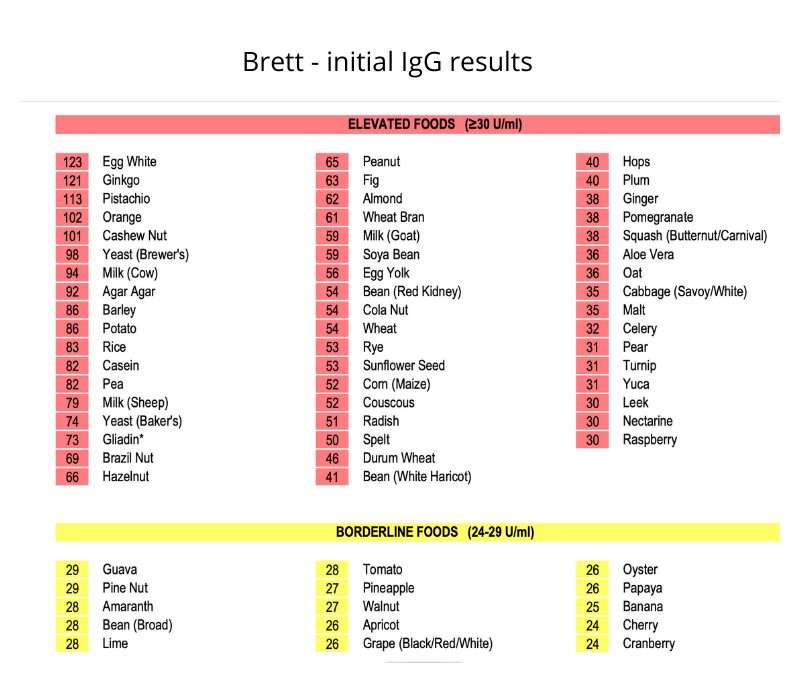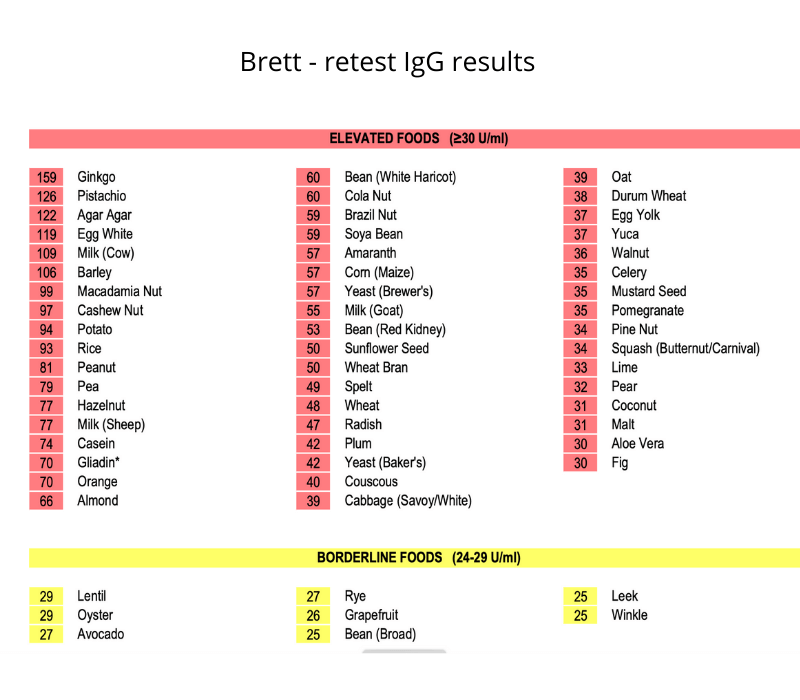Could food sensitivities make it harder for you to lose weight or even stop you from losing weight altogether?
Clinical evidence suggests there is a link between weight loss and a number of food sensitivities as determined by the IgG Food sensitivity testing. To gauge how closely they are related, we conducted a clinical study involving 22 patients with a variety of health complaints including obesity and overweight – read about the study and all weight loss and food sensitivities case studies HERE.
The study participants were guided, monitored and followed up for 6-12 months adhering to the elimination diet. All overweight or obese patients participating in the study lost significant amounts of weight. Furthermore, their other health complaints either completely resolved or significantly decreased. Read all weight loss case studies HERE.
How food sensitivities stop you from losing weight – a case study
Case presentation
Brett, a 58-year-old greenkeeper, presented with a number of health complaints and symptoms including:
- Type 2 diabetes controlled with weekly insulin injections for the past 2 years
- High blood pressure and high cholesterol controlled with medication
- Excess weight increased over the years. Starting weight: 110kg
- Long-term reflux controlled with medication – severity rating: 8/10=severe*
- Bloating and flatulence (from insulin injections), diarrhoea – severity rating: 8/10
- Shortness of breath with moderate exercise – severity rating: 8/10
- Blood sugar imbalances resulting in sugar cravings, binge eating and up /down moods – severity rating: 8/10
- Fatigue and low energy levels – severity rating: 7/10
- Multiple food sensitivities, allergy to bee stings
*Rating scale: 1= mild to 10 = severe symptoms
Brett was taking nine doctor prescribed medications daily and, in addition to feeling better overall, he also wanted to decrease and/or stop taking some of them, if possible (with his doctor’s approval). Food sensitivity testing was suggested to him as a safe method to decrease inflammation, lose weight, improve digestion and gut function.
Prior to the testing, he was consuming a diet comprising many processed foods including commercial breads and bakery products, sweets, beer, and soft drinks.
Brett’s food sensitivity test results showed a large number of food intolerances across many food groups (see the table below). His body was struggling with properly digesting and assimilating the nutrients from the foods he ate, and his immune system was highly reactive to the foods he was sensitive to.
Brett’s initial IgG test results:
- High sensitivity ‘red’ foods: 52 (significant number across many food groups)
- Borderline ‘yellow’ foods: 15
Main foods/ food groups that needed to be eliminated for at least 6 months included:
- Dairy – all kinds: cow, goat, sheep
- Gluten – all gluten containing grains and products made of them
- Eggs – both white and yolks
- Yeast – Brewer’s and baker yeast
- Nuts (7 types)
- Corn and soy

Consultation #2: 1 month on the elimination diet
Brett was keen and motivated from the start to follow the elimination diet to the best of his ability. In the past, it was challenging for him to commit to a diet for long enough to gauge if it could work for him.
He started making substantial modifications to his diet. Brett was supported by his wife who prepared and cooked his meals according to the guidelines. He also began exercising consistently aiming to walk 10k steps daily.
As a result, Brett achieved significant improvements in his symptoms after just one month on the elimination diet as follows:
- Reflux – completely resolved, down from 8/10 to 0/10=severe
- Bloating – significantly improved, down from 8/10 to 4/10
- Flatulence – better but still present, down from 8/10 to 5/10
- Sweet cravings – completely resolved from 8/10 to 0/10. He now craved salt
- Moody especially when hungry – improved, down from 8/10 to 5/10, he was ‘much nicer to be around,’ according to his wife!
- Shortness of breath with moderate exercise – much improved, down from 8/10 to 5/10
- Energy and tiredness – much better, down from 8/10 to 4/10
- Weight loss – 5kg, down from 110kg to 105kg
*Rating scale 1= mild to 10= severe symptoms
Overall, he was doing very well following the elimination diet and he managed to make most of the changes needed. He also started drinking 3 litres daily with added electrolytes for increased hydration and energy.
To help with the gut and digestive repair, he was prescribed probiotics, prebiotics and digestive enzymes.
Consultation #3: 2 months on the elimination diet
Brett continued to improve in all parameters/ symptoms we were monitoring. His energy levels and fitness were increasing steadily and he extended his walks to around 14K steps per day which included bushwalking. He was not able to do this type of exercise for a long-time and seeing the improvements in his fitness levels, he felt even more motivated to keep going.
At this stage, his weight loss since starting the elimination diet was 14kg (from 110kg to 96kg). This was a substantial shift in body weight and Brett felt the physical and mental benefits of this.
Following the elimination diet was difficult for Brett as he had to give up many of his favourite foods in the process. He was still missing them every day, especially bread rolls and beer, but he resisted the temptations seeing the great results so far.
At that time he also saw a few doctors monitoring his diabetes, high blood pressure and cholesterol for check-ups. They were pleasantly surprised by the improvements made by Brett which were also reflected in the improved blood test results and weight loss.
Based on the progress so far, Brett’s endocrinologist paused the weekly insulin injections and decreased one other diabetic drug he was taking. His cardiologist also removed one blood pressure medication and decreased intake of other medications. His cholesterol medication was not adjusted at that time.
Consultation #4: 4 months on the elimination diet
Since our last consultation Brett had a hip replacement surgery and was recuperating. The operation went well and as soon as he could, Brett started working with a conditioning coach and physiotherapist. He was following the elimination diet during this time.
He maintained all improvements achieved prior to the hip operation, including a steady weight despite being a bit less disciplined following the elimination diet and doing limited exercise.
Consultation #4 ad #5: 6 months on the elimination diet
Brett recovered from the hip replacement operation very well and was back at work. He followed the elimination diet at about 90% and started having occasional bread rolls and beer again. He was still exercising regularly, was taking supplements and kept well hydrated.
Consultation #5: 7 months on the elimination diet and the retest
At this stage, Brett was feeling well and he increased his walking exercise to around 23k steps per day, including bushwalking and walking uphill. He relaxed his diet more and was having some of the foods on the ‘red’ list as he found it hard to stick to the strict diet at this point.
He continued drinking 3 litres of water per day (with electrolytes), taking gut support supplements and adhering to the elimination diet at around 90% of the time. Also, he put back on 2kg (i.e. his weight was 99kg).
Brett reported feeling good and having good energy levels. He started gym twice a week in addition to his regular walking routine.
After 6 months on the elimination diet Brett did the 2nd test (retest) to gauge his progress. Here is the summary of the retest results:
- High sensitivity ‘red’ foods: 52 (same number as the initial test)
- Borderline yellow foods: 8 (down from 15)
- Weight loss: 12kg (from 110kg to 98kg)

As seen above, the initial and retest results were very similar, with the main food groups and most other trigger foods unchanged (i.e. dairy, gluten, eggs, yeast, nuts).
Nonetheless, and most importantly, Brett experienced significant decrease in the frequency and intensity of his symptoms. All up he lost 12 kg during the 6 months on the elimination diet.
What were the likely reasons for the IgG antibody levels not decreasing?
During our study, we noticed that in around 50-60% of cases (usually in clients with chronic, long-term conditions) despite the symptoms improving dramatically or even resolving completely, the retests showed a similar or sometimes even greater number of ‘red’ and ‘yellow’ foods (intolerances). There can be a few different reasons for this including:
- Not adhering to the elimination diet sufficiently enough and consuming trigger foods (even in small amounts before the inflammation levels had subsided and the immune system became less reactive. Although Brett adhered to the elimination diet closely in the beginning, he missed certain foods too much towards the end of six months, and decided to reintroduce small amounts of them back into the diet before the retest.
- Retesting too early in the process – checking IgG levels too early may produce results similar to Brett’s due to insufficient time for the antibody levels to reduce naturally, despite having avoided the trigger foods responsible for the elevated IgG levels for 6 months. It’s likely that Brett would need to avoid the trigger foods for a much longer period of time i.e. 12+ months for the IgG levels to fall significantly.
- Leaky gut condition not improving enough – continued issues with increased intestinal permeability (i.e. leaky gut) and trigger foods being inadvertently consumed over that time (even in only small amounts), could be another explanation why certain individuals still have elevated IgG antibodies to foods which have not been knowingly consumed for some time.
- Importantly, in relation to IgG mediated food intolerance symptoms, it is essential to understand that it is not the elevated IgG antibodies as such that cause them, but the deposition of antibody-antigen immune complexes within tissues of the body – please read my post HERE for more detailed explanation. These immune complexes are created when IgG antibodies combine with the food protein antigen(s) for which they were created.
This is a natural process directed by the immune system to expel of what it perceives as invading pathogens. However, when these immune complexes accumulate more quickly than they are removed from the system, they then embed in tissues, causing subsequent inflammation and symptoms.
This may potentially be why, despite Brett still having elevated IgG antibodies to foods from his initial test results (see above), his symptoms dramatically improved with their removal from the diet. This would lead to a subsequent reduction in the formation of immune complexes with their corresponding antibodies and decrease in inflammation levels.
Summary and conclusions
Overall, Brett stated that he felt 60%-70% improvement in his overall symptoms intensity and frequency (see the table below). He listed the main benefits of the elimination as follows:
- Feels better about himself having stuck to the diet for 6 months. He said he ‘didn’t want to let people down’, especially his family
- Able to do more activities such as exercising, walking, gym without experiencing any shortness of breath
- Feels stronger and fitter
- Gut symptoms significantly improved
- Eating more vegetables and fruits, more whole foods and less processed foods
- Was able to reduce doses of and/or stop a number of prescribed medications he was taking

So, in Brett’s case food intolerances turned out to be a major factor in his inability to lose weight for a long time. Therefore, I suggest it may be worth investigating if food sensitivities stop you from losing weight, too.
By committing to the IgG guided food intolerances test and the elimination diet combined with his willingness to learn about how certain foods either help or exacerbate symptoms, Brett found an eating method that works for him most of the time. Providing he doesn’t overindulge in the trigger ‘red’ foods or eats them too often.
This method allows him to manage his baseline health and symptoms, and make decisions if/when to eat certain foods that, at this stage, are still problematic for him to eat.
Overall improvements: 80% from baseline.
Do you think food sensitivities could be stopping you from losing weight?
Feel free to get in touch with me to discuss your current health complaints and circumstances.
I’m a virtual or online Sydney gut naturopath and nutritionist helping clients based anywhere in Australia.
Book an online consultation now or click on the button below to book a free 25-minute initial discussion to talk about your circumstances and how I can help.
I look forward to getting in touch and helping you get better health and wellbeing!
Best of Health
Joanna Sochan
Wholistic Health and Lifestyle Therapist
Natural and Lifestyle Therapies for Abundant Health and Wellbeing
Additional resources
- Weight loss and food sensitivities – Karen’s story
- Eczema diet: foods to eat and to avoid – a case study
- Bee pollen for weightless: a great but totally overlooked strategy
- Top 3 reasons why you are not losing weight
Disclaimer: The above material is for informational and educational purposes only. It should not be used to self-diagnose and it is not a substitute for a medical advice, diagnosis, treatment, prescription or recommendation. All viewers of this content, especially those taking prescription or over-the-counter medications, should not make any changes in their health regimen or diet before first consulting a doctor or other qualified health provider with any questions they may have regarding a medical condition or their particular circumstances.
 Joanna Sochan is a Natural Therapist and founder of Naturimedica Holistic Wellcare. She has a passion for helping clients transform their lives by becoming healthy and well naturally. Joanna has 12+ years experience in clinical practice and has special interest in solving complex cases, gut health, food sensitivities, hormone imbalances, autoimmune disorders and weight loss. She helps clients individually (mostly online) Australia-wide and also offers online therapeutic programs, eCourses and self-help eBooks. View full bio.
Joanna Sochan is a Natural Therapist and founder of Naturimedica Holistic Wellcare. She has a passion for helping clients transform their lives by becoming healthy and well naturally. Joanna has 12+ years experience in clinical practice and has special interest in solving complex cases, gut health, food sensitivities, hormone imbalances, autoimmune disorders and weight loss. She helps clients individually (mostly online) Australia-wide and also offers online therapeutic programs, eCourses and self-help eBooks. View full bio.
 Print This Post
Print This Post 


Leave A Comment